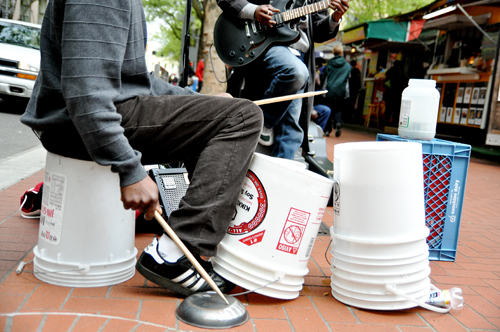Six large white buckets sit under Skidmore Fountain. Some read “Clout Laundry Detergent” and “Kikkoman Soy Sauce,” others contain a multitude of coins, and one is full of $1 bills. A small frying pan with a broken handle lies nearby.
Street beats
Six large white buckets sit under Skidmore Fountain. Some read “Clout Laundry Detergent” and “Kikkoman Soy Sauce,” others contain a multitude of coins, and one is full of $1 bills. A small frying pan with a broken handle lies nearby.

The owner of this percussive array is named Funkplastic, and it is with these items that he manages to make a living each day.
Every Saturday and Sunday the Ankeny Square section of First Street becomes home to the tents, crafts and entertainment of the Portland Saturday Market. In the midst of the artistry and cuisine, the sounds, beats and melodies of buskers, including Funkplastic, resonate through the area.
He, and most other Portland street musicians, is part of a common system that is not obvious to the untrained eye.
Funkplastic, who has been playing street percussion for almost 14 years, began playing in the streets out of necessity. He, like many street performers, has performed all over the nation, and he can be found at the Saturday Market and between Southwest Oak Street and Stark Street from noon to 1 p.m.
He describes his instrument of choice as an unwilled action.
“The buckets chose me. When you’re at a place of desperation in your life, the things that you used to overlook become more prominent,” he said. “Those buckets suddenly began to look like drums to me, and playing them has been my passion since day one.”
Will Scriven, known as Chill Will, who has been playing guitar for more than 40 years, sometimes plays alongside Funkplastic. His solo gigs can be seen heard weekdays on Northwest 25th Avenue and Irving Street and near the food carts on Fifth Avenue during the lunch hour.
Scriven’s situation, however, is a rarity in the streets.
“I have a day job, and most street performers don’t” he said. “I do it because of the money, not because I have to. It’s more of a labor of love than a necessity.”
The passion and love involved in this type of musical career is vital, according to Funkplastic. In order to become a good musician, he believes practicing for 20 minutes a day for five years will make someone an expert. That expertise is crucial when playing for one’s survival.
Zacharias, another street musician who has been singing and playing percussion, guitar and harmonica for decades, agrees.
“You have to be riveting with the audience and connect with the people who can pay you,” he said. “You have to be good at what you do, and people have to like you—this job is not for the faint of heart.”
Not only do street performers have to take into consideration their audience, the weather and events occurring around them; they also have to be aware of each other and the subculture that this awareness has formed.
“There are unwritten rules that the market, events or the streets don’t have,” Funkplastic said. “We’re in constant communication with each other, though, so we understand those rules.”
Zacharias, who has traveled across the U.S. and Europe, said that this subculture is prominent in other parts of the world as well.
“It ebbs and flows and changes at mostly the same pace,” he said.
One unwritten rule of this culture is that playing within a block from each other is considered unethical. Street musicians also communicate with each other if they are being too loud. The “grapevine” of the street musicians helps communicate other information as well.
“There’s certain places where the police will harass us, so when we come across those, we’ll pass that information on,” Funkplastic said. “We make sure we look out for each other, and we’ll turn each other on to other places and events where we know we can all thrive.”
Then there’s the notion of “buying out.” Funkplastic described it as buying your spot in a particular location. The basic rule is if a “spanger” (a person just asking for money) holds a spot that a street performer would like, the musician gives the spanger more money than the spanger would make in that particular location during a certain time period. This happens frequently.
“I have to save money from the night before for this because I just don’t know what’ll happen the next day,” he said. “It’s rude to set up in front or in the vicinity of a spanger. As a street performer, you have to tap into the energy around you or you don’t get paid.”
Typical street performers make 80 percent of their profits on the weekends and some make around $300 a week, depending on the location, weather and atmosphere. To protect his instruments, Funkplastic has “stash spots in each city he plays in,” not unlike most street musicians, so that he doesn’t have to carry his buckets wherever he goes.
“To bet everything in your existence on the weather and where you’ll be situated is crazy, but this is what we’ve been called to do,” he said. “Businessmen come up to us and tell us they’ve had a horrible week and that listening to us has been the best part of it. I believe we’re a vital element to everyone who hears us, and you will find some of the best musicians on the streets.”





